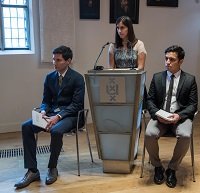Entanglement – a quantum mechanical correlation between particles that can exist even over long distances – might be used for future ways of communication. Teresa Piovesan of Centrum Wiskunde & Informatica (CWI) and QuSoft in Amsterdam studied whether the transmission of information can be made more efficient using entanglement. Positive examples can be found in her PhD thesis, 'Quantum entanglement: insights via graph parameters and conic optimization', which she defends on 27 October 2016 at the University of Amsterdam. Her results can be used to explore the potentials of future quantum computers.
At CWI and QuSoft researchers study the properties and implications of quantum mechanical systems, such as quantum entanglement. Piovesan says: "This quantum mechanical effect allows particles to be correlated in ways that are impossible in a classical world. We have by now convincing experimental evidences that this non-classical behaviour exists in the real world". Researchers investigate what the impact of quantum mechanics is on communication tasks, such as the transmission of information.
To quantify the impact of entanglement, Piovesan developed new techniques combining tools from combinatorics and optimization. She says: "My results concern non-local games and various communication scenarios where no error is tolerated, such as multi-party channel coding and source-channel coding". In particular, Piovesan proved that quantum entanglement can sometimes give an exponential advantage over classical communication systems. "We now have a more unified mathematical framework to study the power of entanglement", she says.
Teresa Piovesan did her research in two research groups at CWI: the Algorithms & Complexity group and the Networks & Optimization group. She was also involved in the QuSoft research centre for quantum software. The work was funded by NWO and the SIQS European project.

Picture 2: Teresa Piovesan during her PhD defence. Source: CWI.
More information
Thesis: 'Quantum entanglement: insights via graph parameters and conic optimization'
By: Teresa Piovesan (CWI: Algorithms & Complexity group and Networks & Optimization group)
Promotor: Prof. Harry M. Buhrman (CWI and UvA) and Prof. Monique Laurent (CWI and UvT)
Date: 27 October 2016, 10.00h
Place: Agnietenkapel, Oudezijds Voorburgwal 231, Amsterdam
Picture 1: Artist's impression - by Shutterstock.
